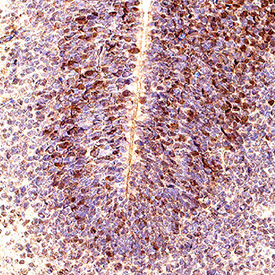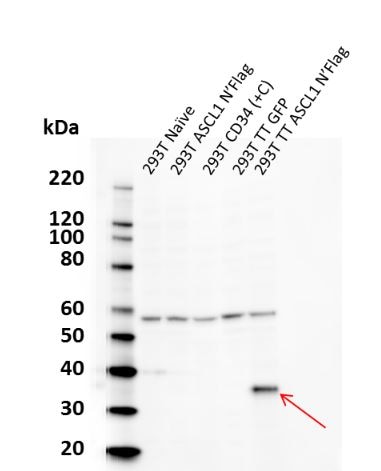Mouse ASCL1/Mash1 Antibody Summary
His74-Asp173 (Gln160Glu)
Accession # Q53WV9
Applications
Please Note: Optimal dilutions should be determined by each laboratory for each application. General Protocols are available in the Technical Information section on our website.
Scientific Data
 View Larger
View Larger
ASCL1/Mash1 in Mouse Embryo. ASCL1/Mash1 was detected in immersion fixed paraffin-embedded sections of mouse embryo (13 d.p.c., cross-section through developing CNS) using Goat Anti-Mouse ASCL1/Mash1 Antigen Affinity-purified Polyclonal Antibody (Catalog # AF2567) at 3 µg/mL for 1 hour at room temperature followed by incubation with the Anti-Goat IgG VisUCyte™ HRP Polymer Antibody (VC004). Before incubation with the primary antibody, tissue was subjected to heat-induced epitope retrieval using Antigen Retrieval Reagent-Basic (CTS013). Tissue was stained using DAB (brown) and counterstained with hematoxylin (blue). Specific staining was localized to cell nuclei. Staining was performed using our protocol for IHC Staining with VisUCyte HRP Polymer Detection Reagents.
Reconstitution Calculator
Preparation and Storage
- 12 months from date of receipt, -20 to -70 °C as supplied.
- 1 month, 2 to 8 °C under sterile conditions after reconstitution.
- 6 months, -20 to -70 °C under sterile conditions after reconstitution.
Background: ASCL1/Mash1
Mash1, also known as achaete-scute complex-like 1 (ASCL1), is a member of the basic helix-loop-helix family of transcription factors. It is required for neuronal commitment and differentiation. The mouse immunogen used to generate this antibody shares 97% amino acid sequence identity with the equivalent region of human Mash1.
Product Datasheets
Citations for Mouse ASCL1/Mash1 Antibody
R&D Systems personnel manually curate a database that contains references using R&D Systems products. The data collected includes not only links to publications in PubMed, but also provides information about sample types, species, and experimental conditions.
2
Citations: Showing 1 - 2
Filter your results:
Filter by:
-
The dual origin of the peripheral olfactory system: placode and neural crest.
Mol Brain, 2011-09-23;4(0):34.
Species: Mouse
Sample Types: Whole Tissue
Applications: IHC-Fr -
Characterization of progenitor domains in the developing mouse thalamus.
Authors: Vue TY, Aaker J, Taniguchi A
J. Comp. Neurol., 2007-11-01;505(1):73-91.
Species: Mouse
Sample Types: Whole Tissue
Applications: IHC-Fr
FAQs
No product specific FAQs exist for this product, however you may
View all Antibody FAQsReviews for Mouse ASCL1/Mash1 Antibody
Average Rating: 4 (Based on 2 Reviews)
Have you used Mouse ASCL1/Mash1 Antibody?
Submit a review and receive an Amazon gift card.
$25/€18/£15/$25CAN/¥75 Yuan/¥2500 Yen for a review with an image
$10/€7/£6/$10 CAD/¥70 Yuan/¥1110 Yen for a review without an image
Filter by:





